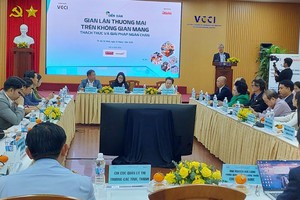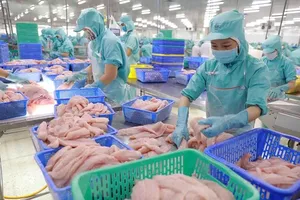Accordingly, the products under investigation are cold-rolled stainless steel in rolls, sheets, or other shapes. Specifically, the notice from MITI stated that this agency will send a questionnaire to relevant parties, including Vietnamese manufacturers and exporters.
According to experts, the rapid increase in Vietnam's steel export turnover has caused many countries to pay attention and conduct safeguard investigations. Previously, Vietnam's steel industry had faced many trade remedies lawsuits initiated by many markets. These lawsuits came mostly from the main steel export markets of Vietnam, such as the US, the EU, some countries in the ASEAN, and even the Eurasian Economic Union.
Only in the last two months, Thailand’s Committee on Dumping and Subsidies decided to impose anti-dumping duties ranging from 6.97 percent to 51.61 percent (CIF price) on iron or steel pipe products originating or imported from Vietnam, consisting of 169 HS codes, to prevent the threat of significant damage to the domestic industry. Or before that, MITI also initiated an anti-dumping investigation on some galvanized steel products originating from Vietnam. The alleged dumping margin for Vietnam was up to 39.27 percent.
At the same time, the Canada Border Services Agency (CBSA) issued a preliminary determination and imposed a temporary tax on Vietnam's corrosion-resistant steel products. The investigation showed that Vietnamese enterprises dumped the above steel products to the Canadian market at a margin from 36.3 percent to 91.8 percent. Similarly, the Australian Anti-Dumping Commission (ADC) launched an anti-dumping and subsidy investigation on steel pipe products originating from Vietnam, China, South Korea, and Taiwan (China). In mid-May, the US Department of Commerce also investigated to apply anti-tax evasion measures on stainless steel sheet products imported from Vietnam.
According to the Trade Remedies Authority, out of 22 recent cases investigated to prevent tax evasion and origin fraud by foreign countries, steel products were sued the most with six cases, accounting for 30 percent. Most of the tax evasion investigations for steel products were launched by the US. In which, as for corrosion-resistant steel products (CORE) and cold rolled steel products (CRS), the US investigated a total of 5 cases. Noticeably, in all investigations, the US concluded that Vietnam's CORE and CRS products were produced with raw materials imported from countries and territories that are evading safeguard measures that the US is applying. The level of investment and transformation in the production of these steel products in Vietnam is insignificant.
According to experts, the rapid increase in Vietnam's steel export turnover has caused many countries to pay attention and conduct safeguard investigations. Previously, Vietnam's steel industry had faced many trade remedies lawsuits initiated by many markets. These lawsuits came mostly from the main steel export markets of Vietnam, such as the US, the EU, some countries in the ASEAN, and even the Eurasian Economic Union.
Only in the last two months, Thailand’s Committee on Dumping and Subsidies decided to impose anti-dumping duties ranging from 6.97 percent to 51.61 percent (CIF price) on iron or steel pipe products originating or imported from Vietnam, consisting of 169 HS codes, to prevent the threat of significant damage to the domestic industry. Or before that, MITI also initiated an anti-dumping investigation on some galvanized steel products originating from Vietnam. The alleged dumping margin for Vietnam was up to 39.27 percent.
At the same time, the Canada Border Services Agency (CBSA) issued a preliminary determination and imposed a temporary tax on Vietnam's corrosion-resistant steel products. The investigation showed that Vietnamese enterprises dumped the above steel products to the Canadian market at a margin from 36.3 percent to 91.8 percent. Similarly, the Australian Anti-Dumping Commission (ADC) launched an anti-dumping and subsidy investigation on steel pipe products originating from Vietnam, China, South Korea, and Taiwan (China). In mid-May, the US Department of Commerce also investigated to apply anti-tax evasion measures on stainless steel sheet products imported from Vietnam.
According to the Trade Remedies Authority, out of 22 recent cases investigated to prevent tax evasion and origin fraud by foreign countries, steel products were sued the most with six cases, accounting for 30 percent. Most of the tax evasion investigations for steel products were launched by the US. In which, as for corrosion-resistant steel products (CORE) and cold rolled steel products (CRS), the US investigated a total of 5 cases. Noticeably, in all investigations, the US concluded that Vietnam's CORE and CRS products were produced with raw materials imported from countries and territories that are evading safeguard measures that the US is applying. The level of investment and transformation in the production of these steel products in Vietnam is insignificant.
























